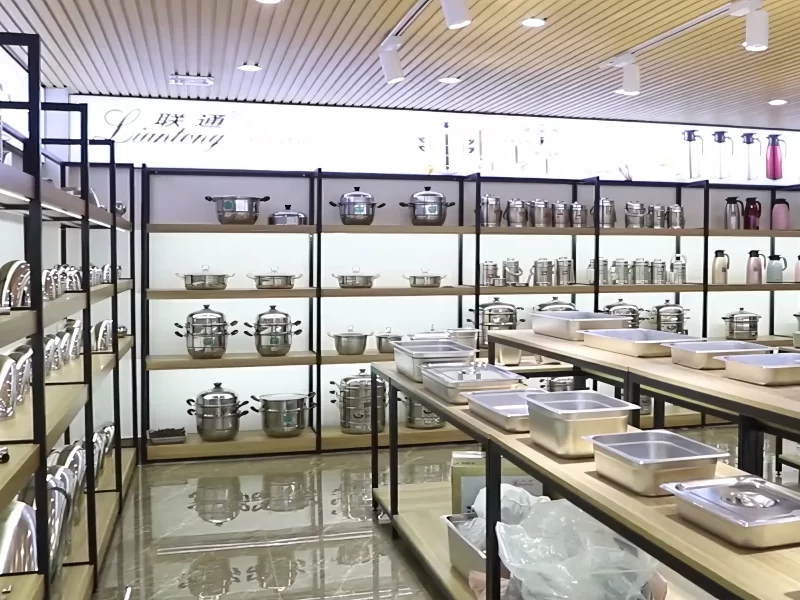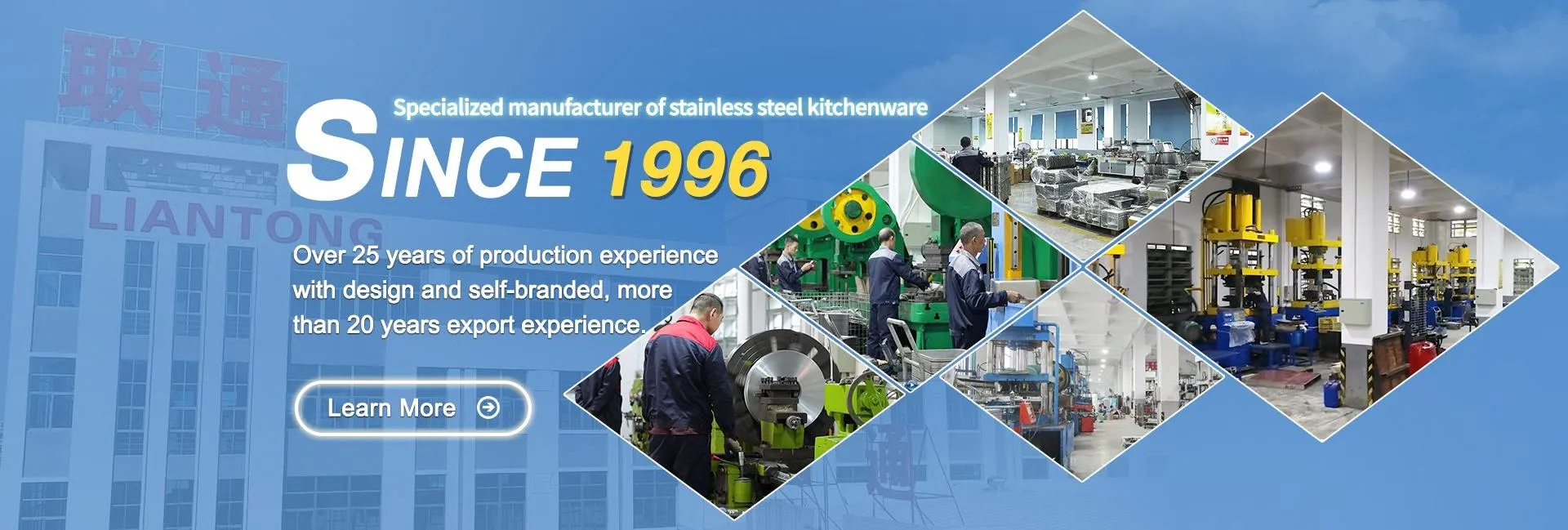
With so many brands and models on the market, choosing the best stainless steel pressure cooker for business needs has become a challenge for many customers. This article aims to provide a detailed guide to purchasing stainless steel pressure cookers to help you understand the key technical parameters, quality evaluation criteria, and factors that affect purchasing decisions, so as to make the best choice.
Material selection
- High-quality materials: German 18/10 or Chines SUS304 stainless steel is preferred, which are durable, not easy to rust, and meet national safety standards. Avoid using 430 stainless steel that may oxidize (rust).
- Composite bottom risk: Some stainless steel pressure cookers use composite bottoms, which heat evenly but have welding problems and may shorten their service life. Ordinary aluminum alloys conduct heat quickly but also dissipate heat quickly, and have low durability and cooking pressure.
Appearance and process inspection
- Surface treatment: High-quality pressure cookers are well oxidized and polished inside and outside, feel smooth and unobstructed, and have no scratches or marks.
- Handle quality: Rubber wood handles should be firmly installed, and the upper and lower handles should be aligned and not easy to loosen, ensuring safety and convenience during use.
Safety valve and exhaust hole
- Safety components: Check whether the safety valve is unobstructed, especially the exhaust holes on both sides of the exhaust pipe, to ensure that the exhaust and pressure reduction can be timely when the pressure is increased.
- Fuse valve: Pay attention to whether the gas dissolving valve on the pot cover is flexible and can dissolve and release gas under a certain pressure. The new spring safety plug is safer, and its flexibility must be confirmed when choosing.
Sealing performance
- Sealing ring design: Check the material and elasticity of the sealing ring, as well as the fit between the pot cover and the pot body. High-quality sealing rings can provide higher safety and prevent accidents.
Overall integrity
- Appearance and accessories: Make sure there are no scratches, complete accessories, tight pot rings, and qualified safety valves. Good appearance ensures service life and safety, and complete accessories make it more convenient for users to use.
Heating method
- Chassis heating: Choose a concave heating plate to ensure that the ingredients are heated evenly and the rice tastes better.
- IH heating: Although it has strong firepower, it is costly and noisy, suitable for users who pursue efficient cooking.
Liner selection
- Stainless steel liner: suitable for soup, resistant to high temperature and high pressure, good insulation effect.
- Ceramic liner: safe and hygienic, good taste but fragile; pay attention to the coating quality, such as PEEK (non-toxic), PFA, etc.
- Aluminum alloy liner: the cheapest and good thermal conductivity, but PTFE coating may release harmful substances after damage.
Functional considerations
- Basic functions are the main ones: too many functions will increase the failure rate and later maintenance costs. Choose products with appropriate functions according to actual needs.
Cleaning and hygiene
- Easy to clean design: choose removable inner cover, large flat water tank and inner container with handle for easy cleaning.
Manufacturer qualifications
Confirm that the manufacturer has legal registration, ISO9001 certification and foreign trade export qualifications, and has a sound quality management system.
Product diversity and delivery speed
- Brand influence: well-known brands (such as Supor and Midea) have mature production lines and supply chain systems, and can usually respond quickly to order needs.
- Sales channels and inventory management: Online sales rely on large warehouses to manage inventory, while offline physical stores can buy and take away immediately if there is stock. Special periods may cause delivery delays due to order backlogs or logistics problems.
New product development support
R&D capabilities: Well-known pressure cooker manufacturers usually have independent new product R&D capabilities and professional design teams to continuously launch innovative products.
Quality stability
- Brand advantages: Long-established brands focus on quality, use high-quality materials and technologies to ensure product stability and reliability. Small factories may lack technical strength, equipment and quality control systems, affecting product quality and safety.
After-sales service
- Selection suggestions: Give priority to brands with national warranty services, which are convenient, fast and low-cost. Good after-sales service can solve problems encountered in use in a timely manner, reducing trouble and extra expenses.
Factors affecting prices
- Brand effect: Premium of well-known brands: Big brands such as Supor have high product prices but quality assurance due to large investments in R&D, production and quality control. Brand marketing will also be reflected in the price.
- Functional diversity: Multi-function vs. single-function: Pressure cookers with multiple cooking functions (such as cooking rice, steaming cakes, etc.) are usually more expensive; simple models that can only cook rice are relatively cheap. Electric pressure cookers are also cheaper if they do not have built-in heating functions.
- Material selection: Ordinary aluminum alloys are less expensive, while stainless steel, although with a higher initial investment, offers higher cost-effectiveness and lower long-term maintenance costs due to its excellent corrosion resistance and long life. Stainless steel will be suitable for high-frequency commercial kitchens. Although the price is slightly higher, the energy-saving benefits are significant.
- Size: Comparison of large, medium and small: Under the same brand and efficiency, large pressure cookers are more expensive because they can accommodate more ingredients and have higher production costs. Mini versions may also be more expensive due to their unique design or small supply.
Through the above comprehensive guide, you can have a more comprehensive understanding of the key factors to consider when purchasing stainless steel pressure cookers as a wholesaler. I hope this information can help you better evaluate the quality and value of the product and make an informed choice.
Our Stainless Steel Pressure Cooker Advantages
Als professional stainless steel pressure cooker manufacturer with 30 years of production experience, we specialize in providing B-end customers with comprehensive stainless steel pressure cooker wholesale customized solutions, designed to meet the needs of commercial kitchens of different sizes and types. The following are some of the unique advantages of our pressure cooker solutions:

- Top material selection: using German high-quality stainless steel to ensure that the pot body is sturdy and durable, corrosion-resistant, easy to clean and maintain, and in line with international food safety standards.
- Equipped with multiple safety protection mechanisms: such as pressure valves, fuse valves, automatic over-pressure relief devices, etc., to fully protect the safety of users during use, especially suitable for high-intensity commercial environments.
- Versatility: Introducing functions such as multi-speed pressure regulation, convenient, explosion-proof, efficient cooking, and one-handed opening to simplify cooking steps, greatly improve production efficiency, and create a pressure cooker with the best user experience.
- Environmentally friendly and energy-saving design: Optimizing heating technology, shortening cooking time, and reducing energy consumption, in line with the concept of modern green business, helps to reduce operating costs.
- Customized solutions: According to the special needs of customers, customized options are provided, from product specifications to additional functions, to ensure that every detail fits your business process.
Choose Linkton’s pressure cooker as your reliable pressure cooker supplier to provide you with high-quality kitchenware and help your business continue to grow.
